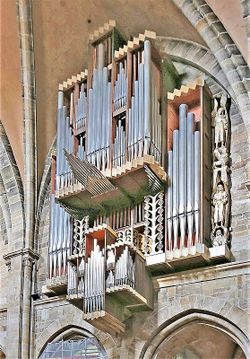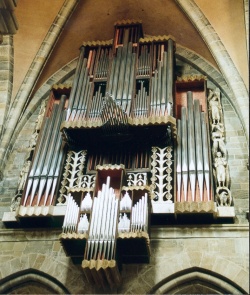Bamberg, Dom St. Peter und St. Georg (Hauptorgel)
Adresse: Domplatz, 96049 Bamberg, Oberfranken, Bayern, Deutschland
Gebäude: Katholische Domkirche St. Peter und St. Georg
Weitere Orgeln: Hauptorgel, Chororgel, Nagelkapelle
| Orgelbauer: | Rieger Orgelbau/Schwarzach (Vorarlberg) |
| Baujahr: | 1976 |
| Umbauten: | Die Orgel wurde in den Jahren 1997-1998 durch die Werkstätten Glatter-Götz und Goll überholt, wobei das Instrument auch verändert wurde. |
| Stimmtonhöhe: | a1 = 440 Hz |
| Windladen: | Schleifladen |
| Spieltraktur: | mechanisch |
| Registertraktur: | elektrisch |
| Registeranzahl: | 78 |
| Manuale: | 4 C-c4 |
| Pedal: | 1 C-g1 |
| Spielhilfen, Koppeln: | Normalkoppeln: I/II, III/II, IV/II, I/P, II/P, III/P, IV/P
Suboktavkoppeln: II/II, III/II, III/III Superoktavkoppeln: III/P Spielhilfen: 3.072 Setzerkombinationen |
Disposition seit 1998
| I Rückpositiv | II Hauptwerk | III Schwellwerk | IV Brustwerk | Pedal |
| Principal 8'
Rohrgedackt 8' Suavial 8' Octav 4' Koppelflöte 4' Superoctave 2' Blockflöte 2' Quintlein 11/3' Sifflöte 1' Sesquialtera 2f Scharff 5f Dulcian 16' Trompete 8' Krummhorn 8' Tremulant |
Principal 16'
Octav 8' Hohlflöte 8' Gedackt 8' Gambe 8' Octav 4' Spitzflöte 4' Quinte 22/3' Superoctav 2' Cornet 5f Mixtura major 5-6f Mixtura minor 4-5f Trompete 16' Trompete 8' Chamade 8' Chamade 4' |
Gedackt 16'
Holzprincipal 8' Holzflöte 8' Bleigedackt 8' Gambe 8' Schwebung 8' Octav 4' Querflöte 4' Viola 4' Nassat 22/3' Octavin 2' Terz 13/5' Mixtur 5f Fagott 16' Trompette harmonique 8' Hautbois 8' Clairon 4' Tremulant Glockenspiel Marimba |
Holzgedackt 8'
Salicional 8' Quintade 8' Principal 4' Holzrohrflöte 4' Nassat 22/3' Octav 2' Holzflöte 2' Terz 13/5' Quinte 11/3' Oktävlein 1' Quintcimbel 2f Regal 16' Vox humana 8' Tremulant |
Untersatz 32'
Principal 16' Subbass 16' Octav 8' Spillpfeife 8' Violon 8' Octav 4' Flöte 4' Jubalflöte 2' Hintersatz 4f Fagott 32' Bombarde 16' Fagott 16' Posaune 8' Clairon 4' |
Originale Disposition 1976-1997
| I Rückpositiv | II Hauptwerk | III Schwellwerk | IV Brustwerk | Pedal |
| Principal 8'
Rohrgedackt 8' Octav 4' Koppelflöte 4' Superoctave 2' Blockflöte 2' Quintlein 11/3' None 8/9' Sesquialtera II-III 22/3' Scharff 5f 11/3' Terzcimbel 3f 1/6' Bärpfeife 16' Krummhorn 8' Schalmei 4' Tremulant |
Principal 16'
Octav 8' Holzflöte 8' Rohrnasat 51/3' Octav 4' Spitzflöte 4' Großterz 31/5' Quinte 22/3' Superoctav 2' Mixtura major 5-6f 22/3' Mixtura minor 4-6f 1' Cornet 5f 8' Trompete 16' Trompete 8' Chamade 8' Chamade 4' |
Pommer 16'
Principal 8' Bleigedackt 8' Gamba 8' Schwebung 8' Octav 4' Querflöte 4' Viola 4' Nassat 22/3' Pfeifein 2' Sifflet 1' Mixtur 5f 2' Buntcimbel 4f 1/2' Dulcian 16' Trompette 8' Hautbois 8' Clairon 4' Tremulant Marimba |
Holzgedackt 8'
Salicional 8' Quintade 8' Principal 4' Holzrohrflöte 4' Nassat 22/3' Octav 2' Holzflöte 2' Terz 13/5' Quinte 11/3' Oktävlein 1' Quintcimbel 2f 1/3' Regal 16' Vox humana 8' Tremulant |
Untersatz 32'
Principal 16' Subbass 16' Octav 8' Spillpfeife 8' Octav 4' Rohrpfeife 4' Nachthorn 2' Mixtur 5f 51/3' Rauschpfeife 3f 2' Fagott 32' Bombarde 16' Sordun 16' Posaune 8' Zink 4' Cornet 2' |
Steinmeyer-Orgel 1940-1976
Orgelbeschreibung
| Orgelbauer: | G. F. Steinmeyer & Co. |
| Baujahr: | 1940 |
| Geschichte der Orgel: | Die Steinmeyer-Orgel wurde 1976 durch die heutige Rieger-Orgel ersetzt. |
| Windladen: | Taschenladen |
| Spieltraktur: | elektropneumatisch |
| Registertraktur: | elektropneumatisch |
| Registeranzahl: | 40 (44) |
| Manuale: | 3 C-a3 |
| Pedal: | 1 C-f1 |
| Spielhilfen, Koppeln: | Koppeln:
Normalkoppeln: I/II, III/II, II/I, III/I, III/II, I/P, II/P, III/P Suboktavkoppel: III/II Superoktavkoppeln: III/I, III/II, III/III
|
Disposition
| I Positiv | II Hauptwerk | III Schwellwerk | Pedal |
| Violflöte 8'
Quintatön 8' Geigenprästant 4' Rohrnasat 22/3' Blockflöte 2' Terz 13/5' Cymbel 3f 1/2' Rankett 16' |
Principal 16'
Principal 8' Gemshorn 8' Gedackt 8' Octave 4' Salicet 4' Quint 22/3' Octave 2' Spitzflöte 2' Mixtur 4-6f 11/3' Cornett 3-5f 8' Trompete 8' |
Stillgedackt 16'
Rohrflöte 8' Salicional 8' Weitprincipal 4' Nachthorn 4' Waldflöte 2' Sifflöte 1' Terzian 2f 13/5' Scharff 4f 1' Fagott 16' Krummhorn 8' Knopfregal 4' Tremulant |
Principalbass 16'
Subbass 16' Zartbass 16' [1] Quintbass 102/3' Octavbass 8' Choralbass 4' Flötbass 4' [2] Rohrpfeife 2' Mixturbass 4f 22/3' Posaune 16' Fagottbass 16' [3] Krummhorn 8' [4] |
Anmerkungen:
Bibliographie
| Literatur: | Organa Europae 2010 |
| Weblinks: | Website des Doms |

